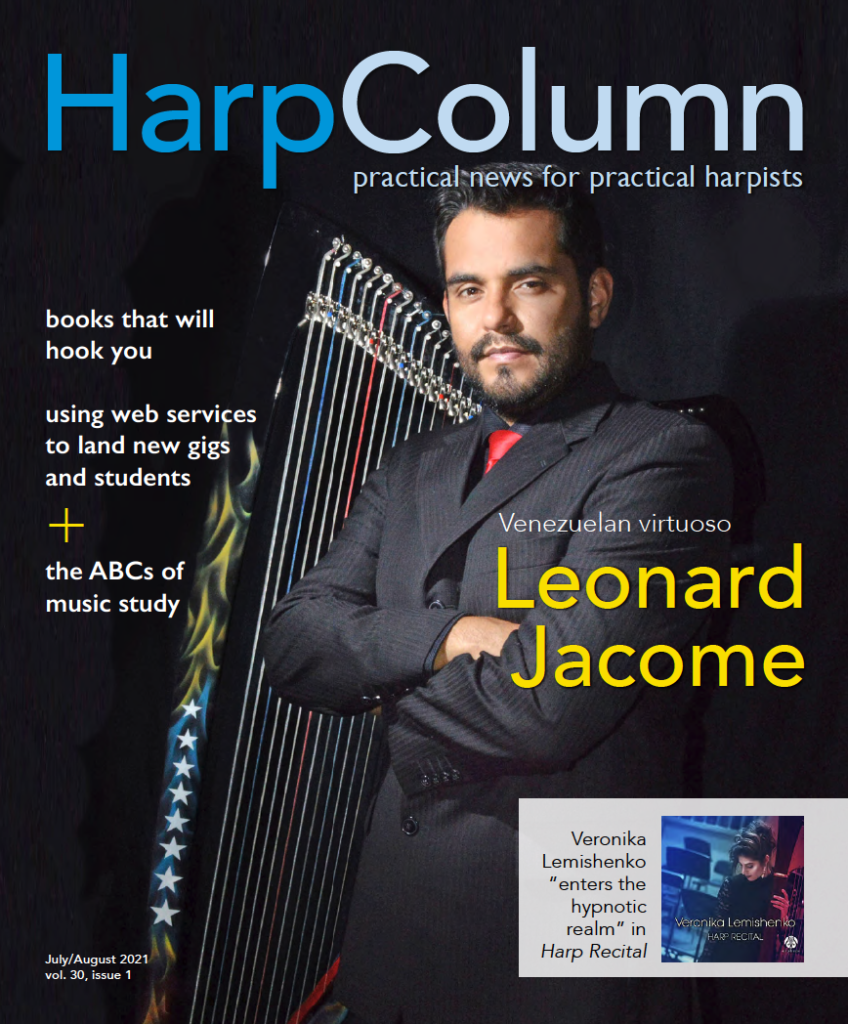Regular Harp Column readers might remember our recent interview with Breton harpist Tristen Le Govic (see “Breton Brilliance” in the November/December 2020 issue of Harp Column). Le Govic had lots of interesting things to say, but one observation at the end of our conversation really stuck with me. “When I travel around the world and meet folk harpists from other traditions outside of the Celtic world, even with all of these different harps, it feels like we are talking the same language…When I started studying at the conservatory, people said to me, ‘Oh, Breton music is great, but do you think you can do something with that? You have to play pedal harp to meet other musicians.’ But this is my instrument, this is my music. I don’t think I would have gone as far and met as many people from around the world. I don’t know if my experience would be the same if I played a different instrument.”
If a Hollywood studio was to make this story into a movie, it would do well to cast Leonard Jacome as himself.
Le Govic is a brilliant musician who specializes in a small subset of Celtic music from his Breton heritage. The harp is already considered by many to be a niche instrument. In an age where freelance musicians are told that being all things to all people will help land you work and fill your calendar, focusing on a specific genre within a specialty instrument would seem, at first glance, to be a questionable career move. But what I heard from Le Govic was that his full-throttle pursuit of Breton music isn’t about getting ahead in the music world. It simply defines who he is. It’s almost as if he doesn’t have a choice in the matter.
Fast forward six months, and I experienced déjà vu in my conversation with this issue’s interview subject, Leonard Jacome. Jacome’s story plays out like a Hollywood movie (if Hollywood was into stories about harpists): Boy from a tiny Venezuelan village in the Andes mountains makes it to the big city to study music. Boy grows up and becomes a smashing success in his native country. Political and economic climate takes a turn for the worse, and he must flee his homeland to escape the deteriorating situation. He never forgets his roots, despite continued success abroad, and pursues his dreams of sharing the music of his homeland with the world.
If Hollywood was to make this story into a movie, it would do well to cast Leonard Jacome as himself. He is as compelling a character as they come, and his music will win over even the most jaded critics. Like Le Govic, it was something Jacome said near the end of our interview that stayed with me.
“The harp is my life. I don’t need anything more…The music of my country and my people and all of these other styles from the world are in my heart, and I bring that passion to the harp.”
Jacome’s dedication to Venezuelan harp music—a tiny corner of a tiny corner of the music world—seems like a narrow play if you are trying to make it in this business. But Jacome’s motivation is not fame or money or accolades. To be a Venezuelan harpist is not a choice for Jacome. The instrument and the music are who Leonard Jacome is.
I suspect that like Le Govic and Jacome, for many of us, playing music is more of a compulsion than a choice. I also wonder, though, if that compulsion runs deeper when your connection to the music or the instrument are deeply rooted in your culture, your language, or your family. One thing for certain—the world is richer for having passionate artists, like Jacome, who are intent on sharing their music with anyone who will listen. •






